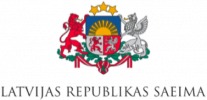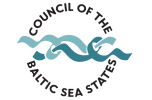On 24 October 2025, the Baltic Assembly held its annual Consultative Council in Riga, Latvia, which brought together Members of the Presidium, Chairs, Vice Chairs, and Members of the Baltic Assembly Committees to discuss key issues and set priorities for the next year.
Under the leadership of Latvia in 2025, the Baltic Assembly concentrated on a safeguarded, prosperous and innovative Baltic region; an interconnected energy, transport and digital policy; and a protected, biodiverse and sustainable Baltic Sea. The motto of the Latvian presidency, “Growing Strong Together”, was a driving force for cooperation across the Baltic region.
Economics, Energy and Innovation Committee: logistics, energy networks, Rail Baltica
Chair of the Economics, Energy, and Innovation Committee of the Baltic Assembly Andris Kulbergs stated that during the presidency of Latvia, the Committee focused on Baltic State connectivity through logistics, energy networks, and Rail Baltica.
He emphasised that the Baltic region must redefine its logistics strategy to match new geopolitical realities, shifting focus from East–West to North–West connections. The current infrastructure is outdated and financially draining for companies, meaning that a unified regional approach that prioritises rail development, especially through Rail Baltica, over road transport is essential. Limited coordination and poor use of available European Union funds threaten progress; the Baltic States should be united in this matter. Additionally, greater cooperation regarding both logistics and energy strategies to build a sustainable, secure, and competitive regional future was also urged.
Education, Science and Culture Committee: comprehensive defence, the Baltic Science Fund, the Baltic Way
Chair of the Education, Science and Culture Committee of the Baltic Assembly Juris Viļums informed that this year the Committee mainly focused on comprehensive defence in education, the creation of the Baltic Science Fund, and the future legacy of the Baltic Way.
He stated that comprehensive defence is a shared social responsibility that unites civilian, economic, and social efforts. Schools across the Baltics are now integrating crisis preparedness, media literacy, and psychological resilience into their programmes to help young people think critically and resist disinformation. The Baltic Media Excellence Centre continues to strengthen regional cooperation through training on media and artificial intelligence. Regarding science, the Committee called for the creation of a Baltic Science Fund to ensure stable support for joint research and innovation in various fields. As the 40th anniversary of the Baltic Way approaches, continued investment in education and culture to keep alive the values of unity, democracy, and shared identity across the Baltic region was urged.
Health, Welfare and Family Committee: data exchange, joint medical procurements, healthcare research, Advanced Particle Therapy Centre
Vice Chair of the Health, Welfare and Family Committee of the Baltic Assembly Saulius Čaplinskas informed that this year the Committee mainly prioritised healthcare data exchange, joint medical procurements and reserves, regional healthcare research, and the creation of an Advanced Particle Therapy Centre in the Baltics.
The Committee focused on advancing digital transformation in healthcare to enable cross-border data exchange and improve diagnostics, treatment, and public health responses. Achieving this requires harmonised regulations and skilled professionals capable of using new technologies. Strengthening joint medical procurements under the Baltic Partnership Agreement remains a key goal to reduce costs and secure supplies, while coordinated strategic reserves are needed to ensure resilience in crises. The Committee also supported stronger regional cooperation in healthcare research and the establishment of a Baltic Science Fund to finance shared priorities and improve competitiveness in European programmes. A major long-term initiative under discussion is the creation of the Advanced Particle Therapy Centre with CERN, which would bring next-generation cancer treatment and research capacity to the region.
Natural Resources and Environment Committee: sustainable agriculture and forestry, protecting biodiversity in the Baltic Sea
Chair of the Natural Resources and Environment Committee of the Baltic Assembly Jānis Grasbergs informed that in 2025 the Committee focused on two key topics: cooperation towards a more sustainable agriculture and forestry, and protecting biodiversity in the Baltic Sea. The Baltic Assembly has previously discussed these issues, and the conclusion has been quite clear: sustainable management can bring numerous benefits.
The Committee underlined that sustainability is central to resilient economies and healthy ecosystems, promoting measures such as organic farming, agroforestry, and biodiversity protection. Regional initiatives like LIFE OrgBalt and BIOEAST demonstrate that knowledge-based cooperation can drive real progress in agriculture and forestry. Joint efforts remain vital to address shared challenges such as forest pests, fires, and illegal timber flows from Russia and Belarus. The Committee also called for a unified Baltic approach to the Common Agricultural Policy to ensure long-term support for agriculture. On marine protection, cooperation through HELCOM and BALTFISH continues to strengthen, with a focus on balancing environmental protection with sustainable fisheries and economic interests. Future priorities include reducing agricultural runoff, improving wastewater management, exploring sustainable aquaculture, and coordinating wind farm development.
Security and Defence Committee: resilience through conscription, maritime cybersecurity, military industry, common defence area
Chair of the Security and Defence Committee of the Baltic Assembly Uģis Rotbergs informed that the Commitee focused on four key topics: youth resilience through conscription, maritime cybersecurity in the Baltic Sea, cooperation of the military industry, and advancing a common defence area.
He underlined that small countries are stronger together and that security depends on unity across military and civil sectors. Conscription plays a vital role in building patriotic and resilient citizens who understand the defence system and values of their countries. Currently, maritime cybersecurity is a growing concern due to increasing risks to underwater cables and infrastructure, meaning that real-time monitoring, shared data, and joint development of drone systems are needed. The Baltic Defence Line is and will continue to be a top priority in the defence sector. However, disinformation is still threatening Baltic unity, making mutual trust and cooperation essential. Only in a secure region can education, healthcare, and environmental protection advance further.
Looking ahead: The Estonian presidency in 2026
As the Estonian delegation takes over the Presidency in 2026, Vice President of the Baltic Assembly Timo Suslov reported that the Baltic Assembly will continue to prioritise security, connectivity, and innovation. The focus will include advancing coordinated strategies, digital and energy connectivity, and innovative competitiveness in all three Baltic countries.
The Baltic Assembly will also deepen its partnerships with the Benelux, Nordic, and Visegrad countries, seeking regular information exchange and experience sharing to address common challenges. Additionally, the partnership will also continue to support the Eastern Partnership countries, particularly Ukraine. As the region faces increasingly complex issues, cooperation within and beyond the Baltic States remains essential for a resilient and prosperous future.
Photos
© Ieva Ābele, Saeima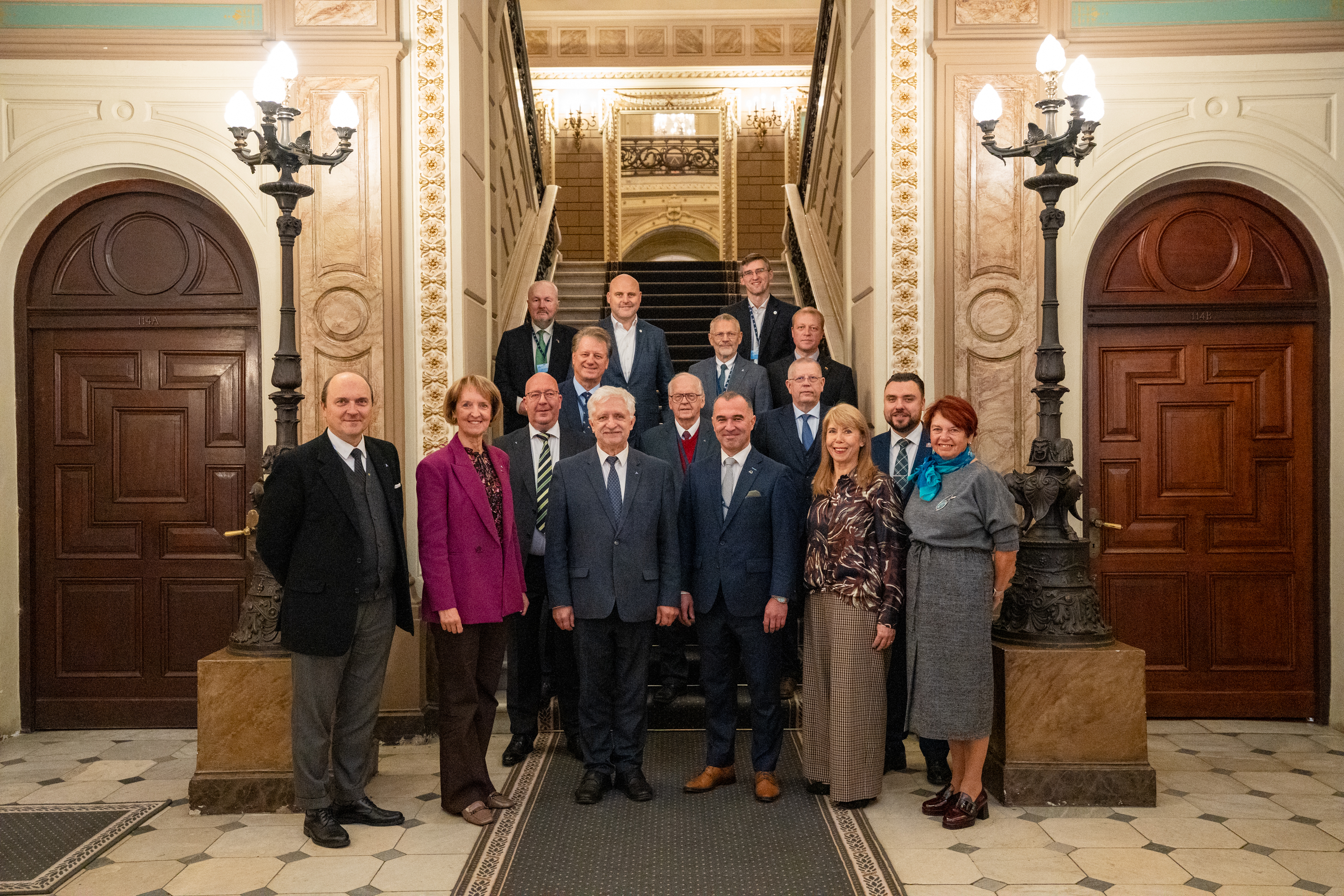
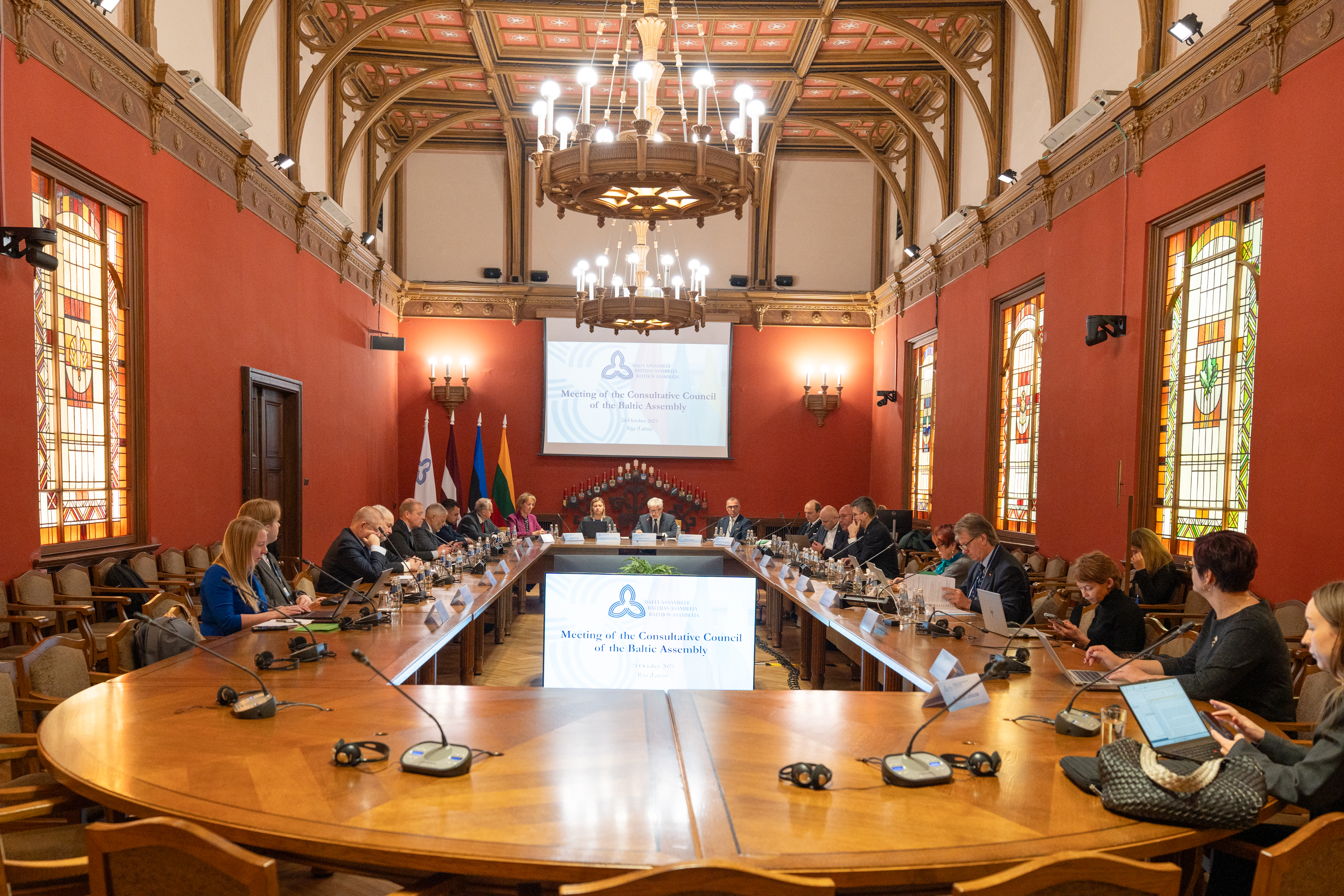
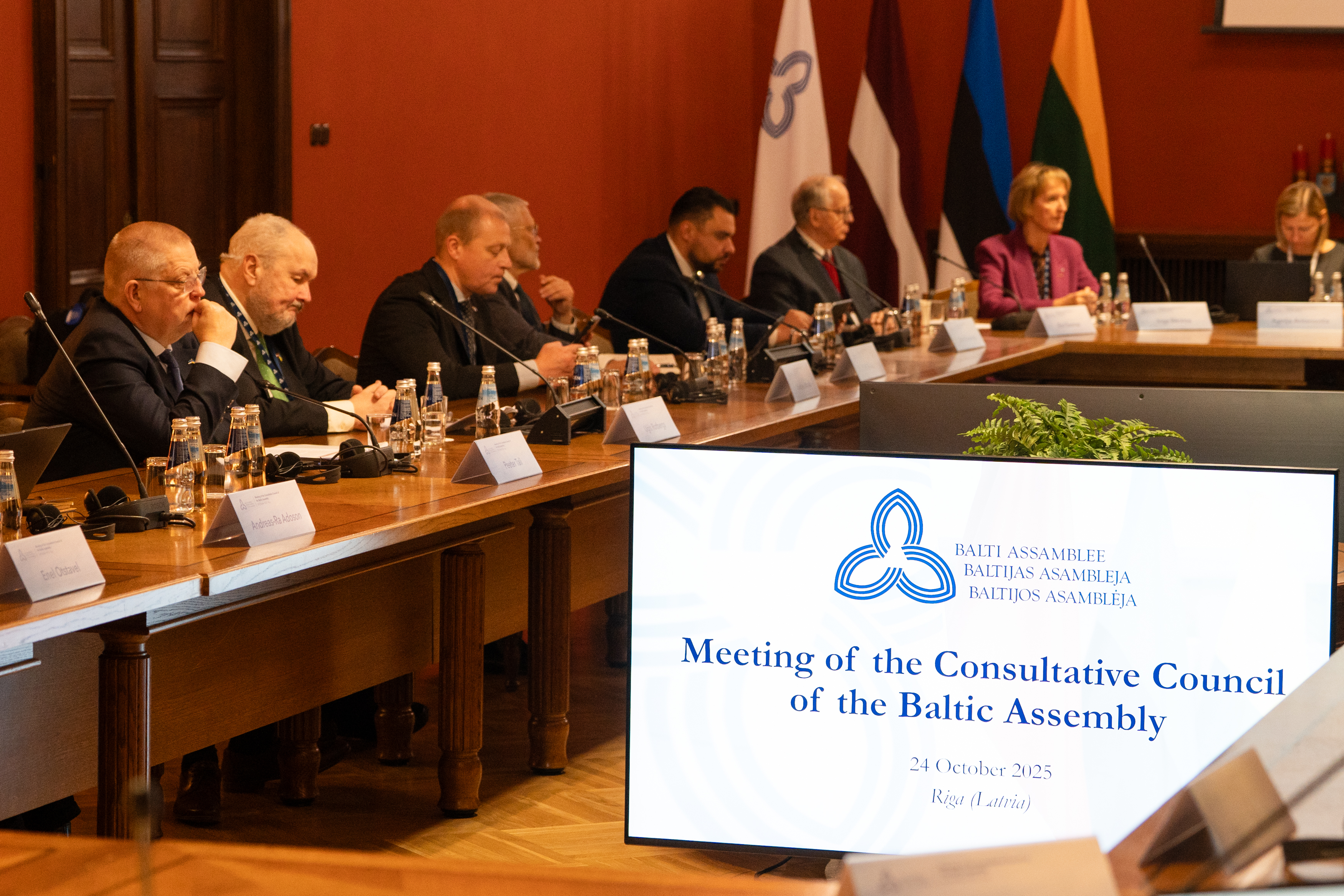
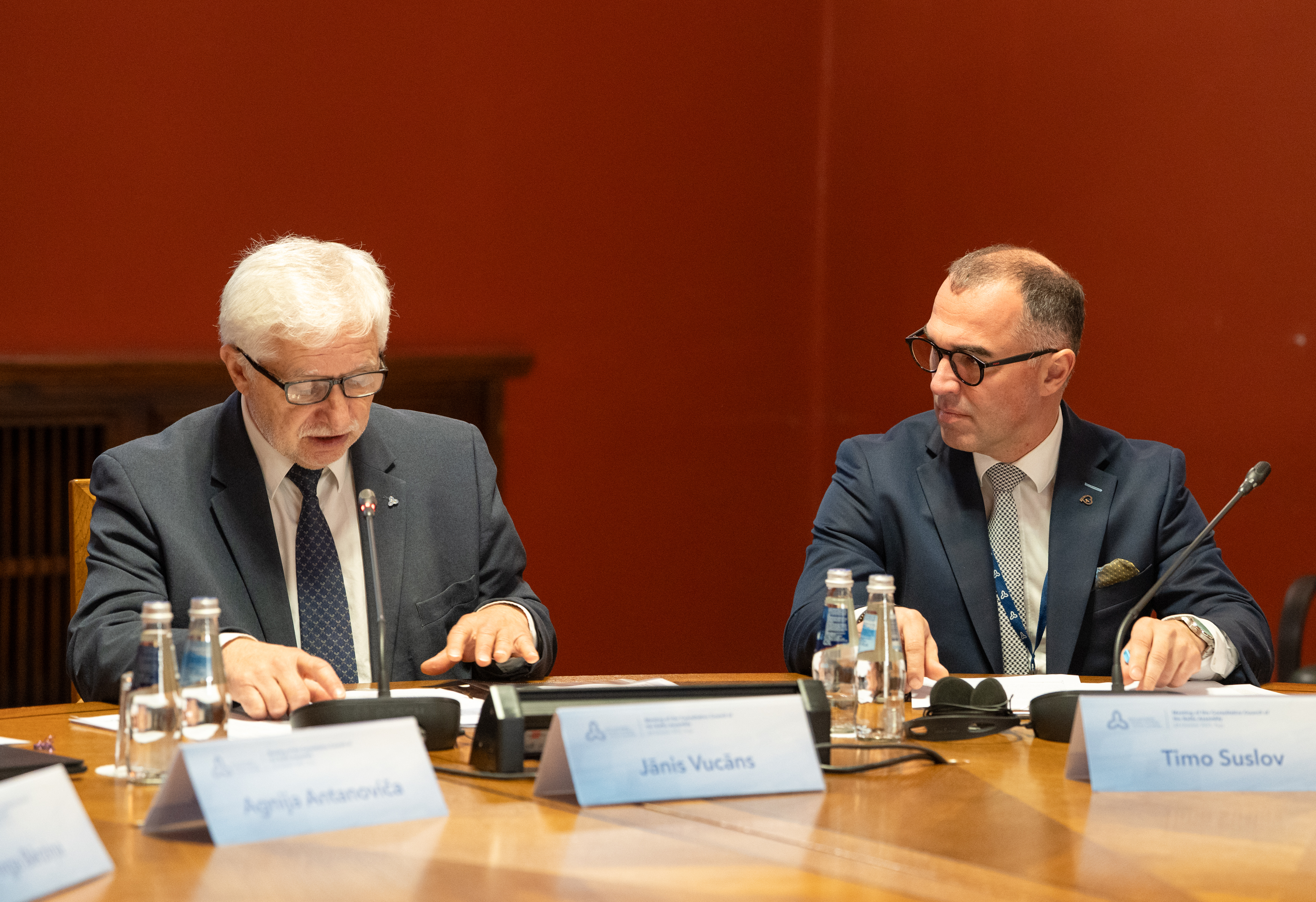
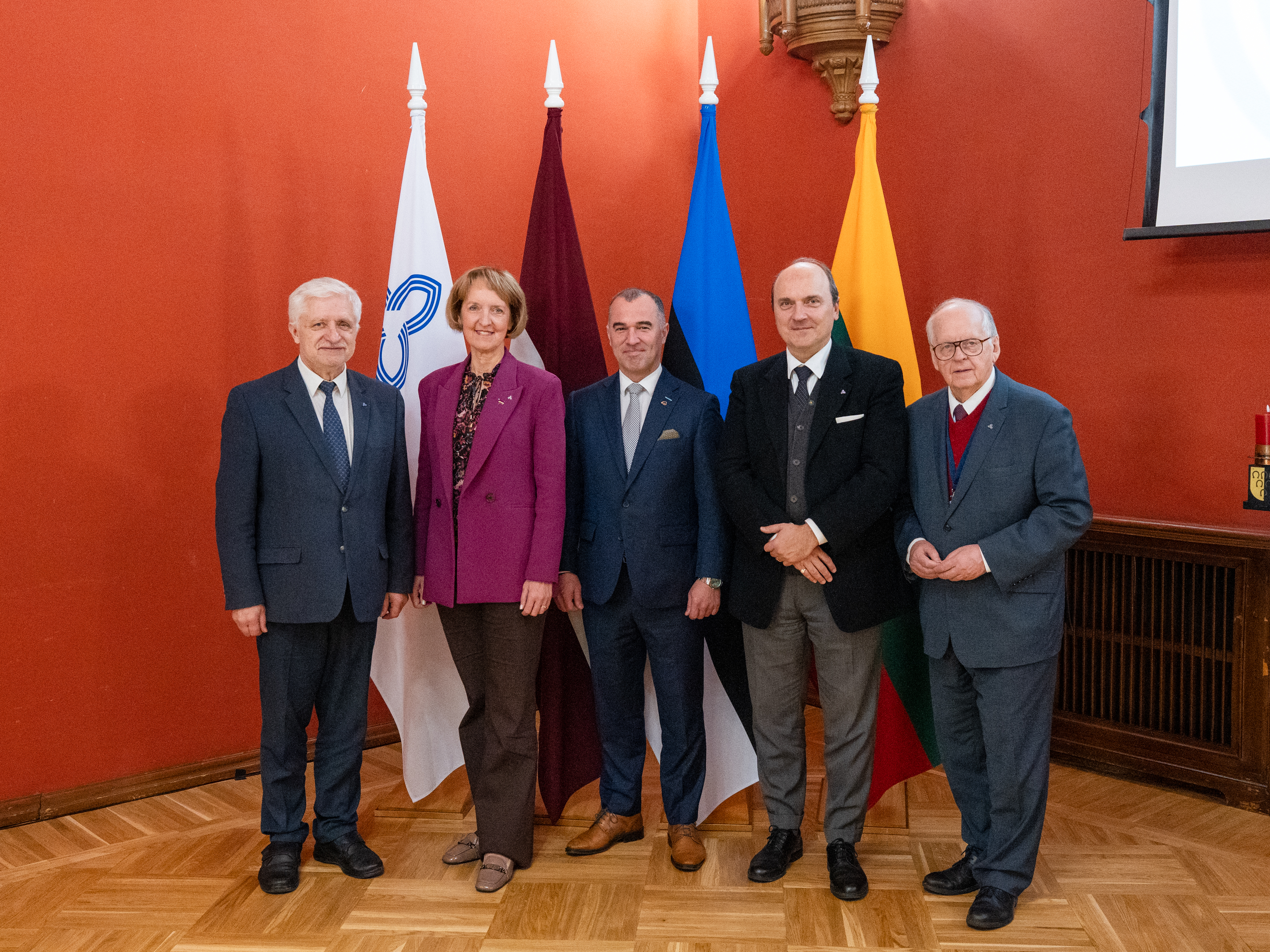
 Print
Print 

